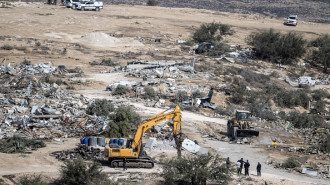Use of Beirut port blast footage in upcoming US movie "The Creator" sparks outrage
A movie trailer that uses apparent footage of the 4 August 2020 Beirut port blast has sparked outrage in Lebanon, just a few days before the third anniversary of the explosion, which killed at least 251 people and injured over 7,000.
The US science-fiction film "The Creator" used a shot from the Beirut port explosion to advertise its film, slightly modifying the city's appearance through video editing.
A video of visual effects experts analysing the trailer compared the movie scene with the original footage and pointed to similarities in lighting and buildings in both shots.
"Just to know that under the surface of visual effects is actual devastation, suffering and death. It's just upsetting; it's not a good idea," one of the visual effects experts said.
The use of the real-world clip also prompted outrage from Lebanese, many of whom still suffer from trauma from the explosion which ripped through the city just three years earlier.
Footage of the #BeirutPort crime turned into material for creating visual effects, with a clip of the explosion being used to design visual effects for nuclear explosions on film. Last week, a promotional video for the film “#TheCreator” was released featuring a simulation of a… https://t.co/WD66SaEUBR
— Megaphone (@megaphone_news) July 31, 2023
It also prompted questions about Western hypocrisy regarding which countries' tragedies are acceptable for use in entertainment, if even years later.
"I just wanna know. Did they use clips of 9/11 like this? Of the Notre Dame cathedral burning? As usual, your suffering is only real and worth respecting if you're white," Sarita, a Twitter user, wrote.
In 2002, a trailer for the Hollywood blockbuster "Spider-Man" was pulled off the air after the September 11th attacks, as the original trailer showed the superhero ensnaring criminals between the Twin Towers.
On Friday, marches are planned in Beirut in front of the site of the port explosion to protest the lack of justice in the man-made disaster three years after the fact.







 Follow the Middle East's top stories in English at The New Arab on Google News
Follow the Middle East's top stories in English at The New Arab on Google News


